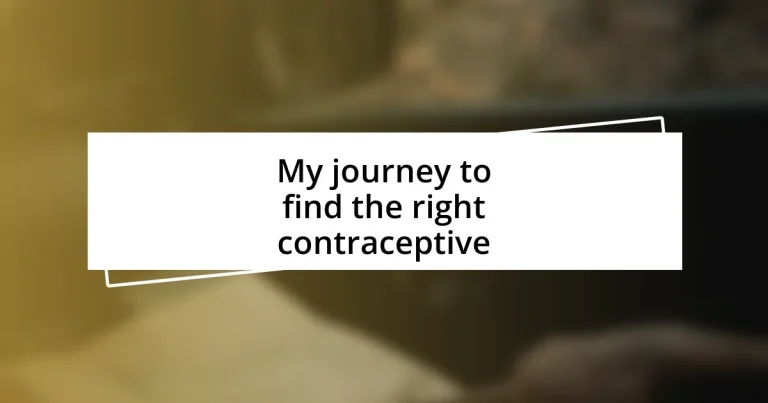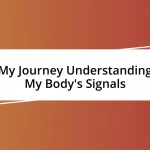Key takeaways:
- Exploring personal health needs and understanding how contraceptive methods can address both pregnancy prevention and overall health is crucial for informed decision-making.
- Consulting healthcare professionals provides valuable insights and personalized guidance, making it essential to engage in open dialogue about concerns and preferences.
- The process of trial and adjustment is normal when finding the right contraceptive, requiring patience and self-compassion as individuals learn to tune into their bodies’ responses.
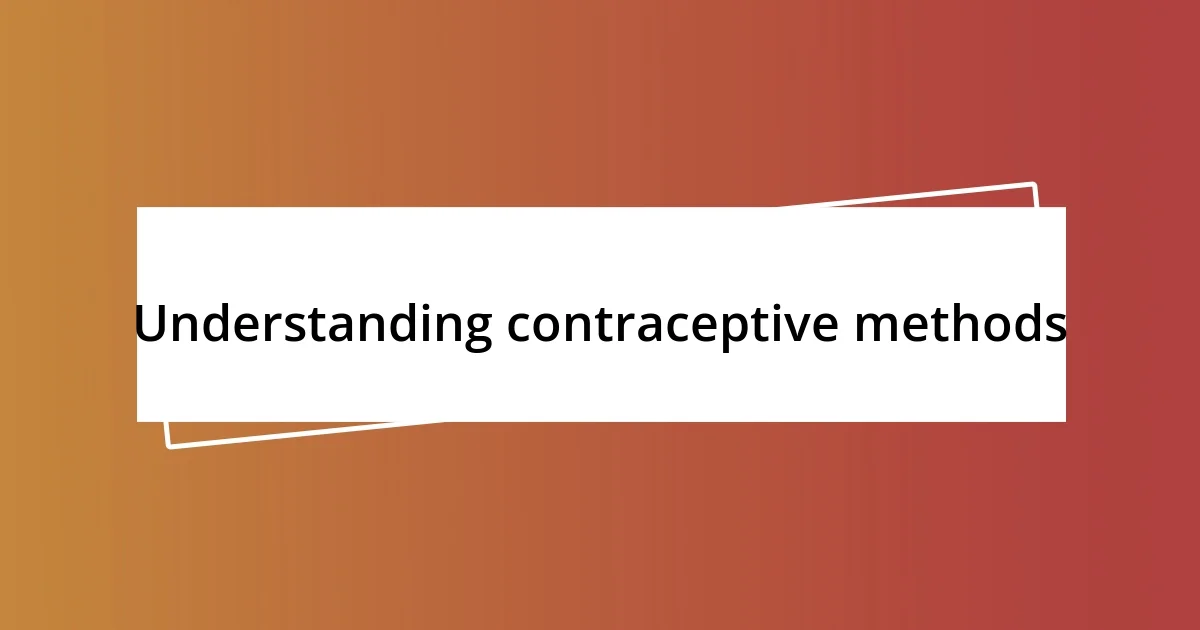
Understanding contraceptive methods
When I first started exploring contraceptive methods, I was overwhelmed by the sheer variety available. From pills to IUDs, each option seemed to present its own set of benefits and drawbacks. How can one possibly choose the right method without feeling like they’re lost in a maze of information?
I remember a friend who opted for the birth control patch. She loved the convenience of it and shared how much more at ease she felt knowing she wouldn’t have to remember to take a pill daily. Isn’t it fascinating how a small change can have such a big impact on our lives? Personal experiences often highlight the importance of finding something that fits not just our bodies, but our lifestyles as well.
Understanding how different contraceptive methods work can be crucial in making informed choices. For instance, some methods, like hormonal implants, not only prevent ovulation but can also improve conditions like heavy periods. Have you ever considered the broader implications of your choice? It’s worth contemplating how a contraceptive can affect your overall health and well-being, beyond just pregnancy prevention.
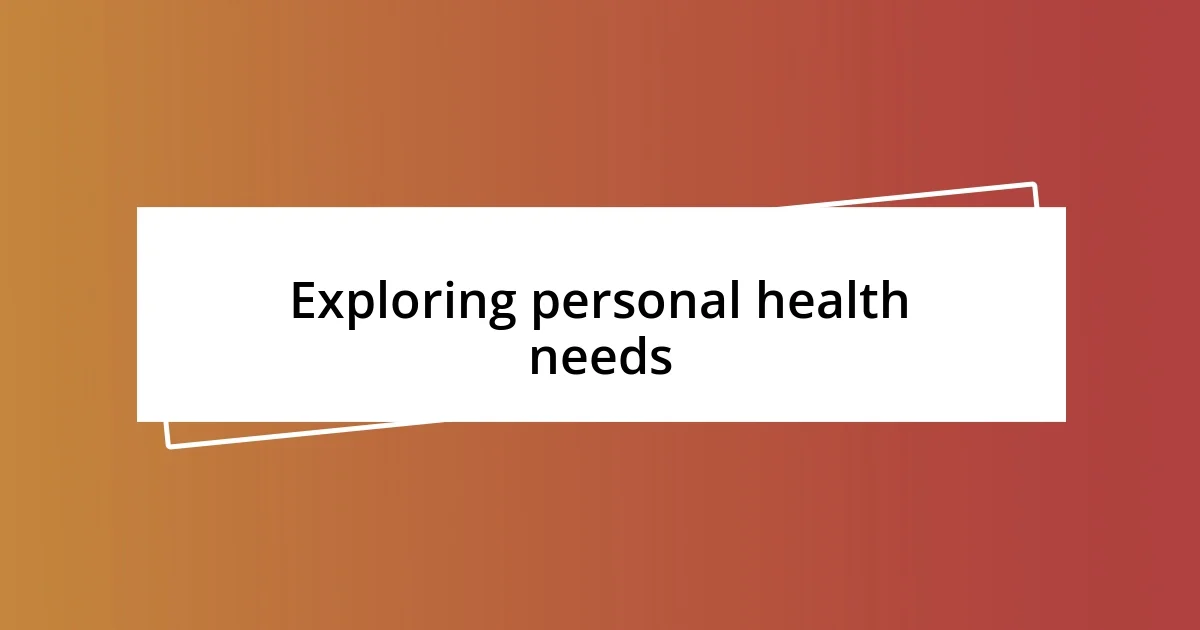
Exploring personal health needs
When considering my personal health needs in the context of contraception, I found it essential to reflect on my lifestyle and underlying health conditions. For example, I’ve always struggled with irregular cycles. Discovering that certain contraceptives could help regulate my periods was a revelation! It made me realize that the right choice could not only assist with pregnancy prevention but also enhance my overall health.
As I began to evaluate different contraceptive options, my family history played a significant role in my decision-making process. I learned that having a close relative with blood clot issues could elevate my risks with certain hormonal methods. This was eye-opening and made me appreciate the need for a personalized approach when choosing contraceptives.
While social influences can sometimes sway our decisions, I encourage everyone to prioritize their unique health needs. I remember how my friend felt pressured to choose a method based solely on popularity among peers, which ultimately caused her distress. Personalizing your health journey ensures that your contraceptive choice is genuinely supportive of your well-being.
| Factor | Considerations |
|---|---|
| Health Conditions | Impact on choice (e.g., hormonal imbalance) |
| Family History | Potential risk factors (e.g., blood clots) |
| Lifestyle | How often can you remember to take pills or replace a patch? |
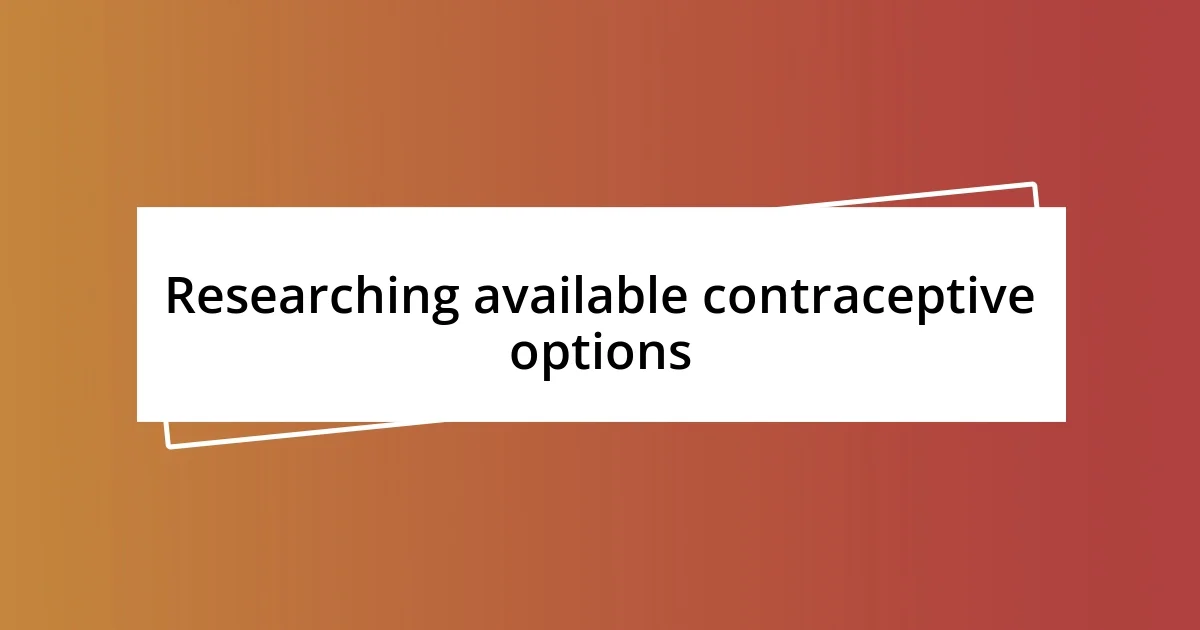
Researching available contraceptive options
Researching available contraceptive options was a journey of discovery for me. As I dove into the myriad of choices, I quickly realized that each method not only had its distinct mechanics but also catered to different needs and preferences. I remember poring over websites, watching videos, and even reading testimonials to gauge how others felt about their choices. One night, I spent hours on a forum, where women passionately shared their experiences; it was a reminder of how connected we are in this shared journey of understanding our bodies.
When evaluating options, I found it helpful to create a list of characteristics essential to my selection process. Reflecting on the unique blend of information available, I considered several key factors before making my decision:
- Effectiveness: How well does this method prevent pregnancy?
- Convenience: Is it easy to integrate into my daily routine?
- Side Effects: What potential changes should I expect?
- Health Compatibility: Does it align with any pre-existing health conditions?
- Cost: Can I afford this option long-term?
Ultimately, researching contraceptive choices isn’t just about gathering facts; it’s about listening to my intuition and understanding what feels right for my body and life. Each piece of information added depth to my journey, guiding me towards the best personal fit.
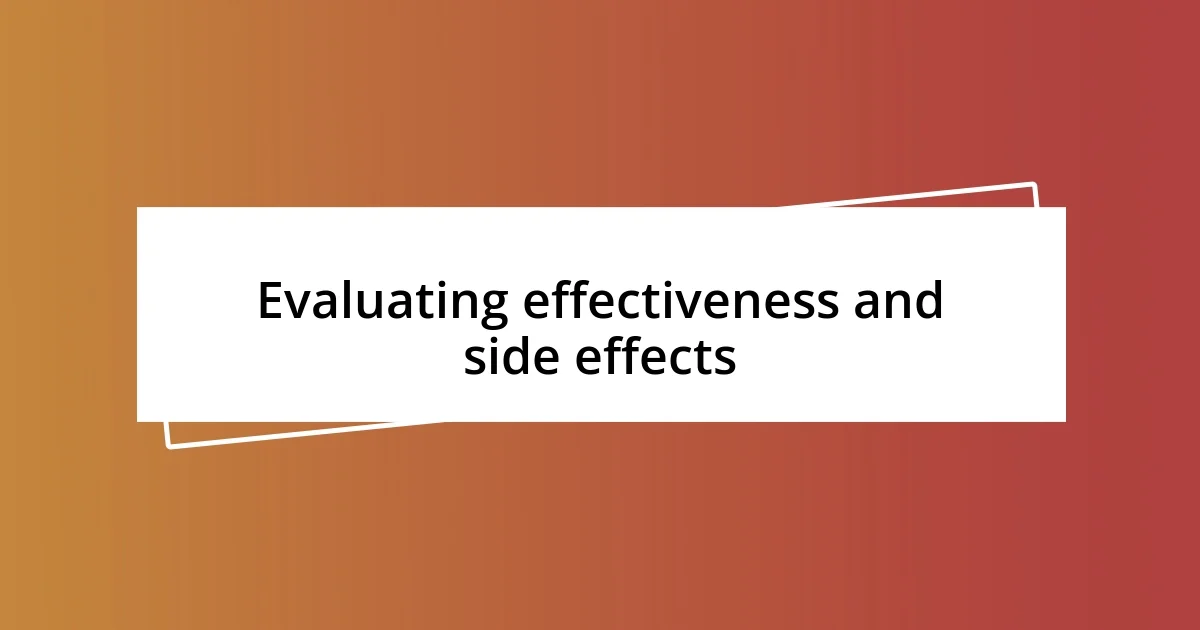
Evaluating effectiveness and side effects
When I started looking into the effectiveness of different contraceptive methods, I was taken aback by the variety—some boast over 99% efficacy, while others hover around the 70% mark. This made me wonder: how much weight should I give to effectiveness in my decision-making? I distinctly remember reading about a friend who chose a method based solely on its high effectiveness, only to face unexpected side effects that overshadowed its benefits.
Side effects can be such a mixed bag. I experienced some myself when trying a hormonal contraceptive; my mood swings often felt like a rollercoaster ride. It made me question whether the prevention of pregnancy was worth the trade-off for my emotional health. Hearing others’ stories forged a connection that reassured me I wasn’t alone—many women endure this same struggle when their bodies react differently to hormonal changes.
In my case, evaluating side effects also taught me about patience. Initially, I thought acknowledging any discomfort meant I had chosen the wrong method, but soon I learned that some side effects could subside over time as my body adjusted. It made me ponder how often we rush to judgment without giving ourselves the grace to adapt. Isn’t that a lesson we can carry beyond just contraception? Each individual’s journey is unique, and sometimes, finding the right balance takes a bit more exploration and understanding.
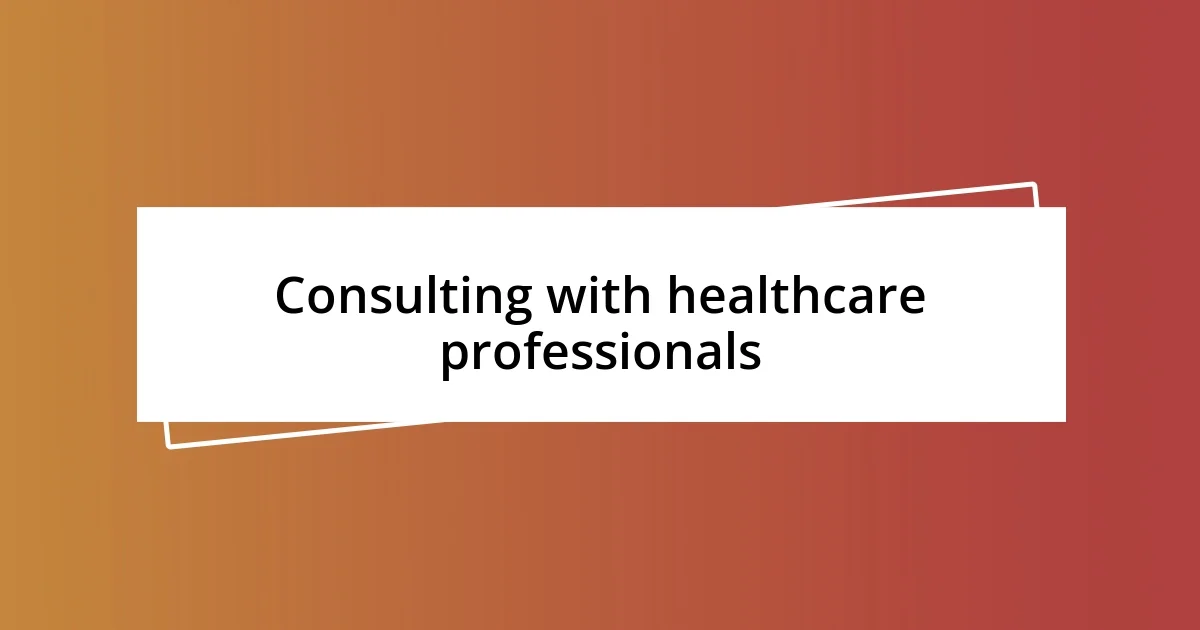
Consulting with healthcare professionals
Talking to healthcare professionals was a crucial step for me in finding the right contraceptive. I remember my first appointment, sitting nervously in the waiting room, but the moment I began discussing my concerns, I felt a weight lift. It was refreshing to dive into the specifics of my lifestyle and health with someone knowledgeable who could offer tailored advice. I’ve found that their insights often came from years of experience, making them incredibly valuable.
Once I started discussing my options with my doctor, I realized how much I had yet to learn. They shed light on various methods I had not considered, helping me understand the nuances of each. I still recall the time my doctor explained the hormonal vs. non-hormonal options, emphasizing how they could align differently with my daily life and emotional well-being. It made me think, have we underestimated the importance of having these conversations? Engaging openly not only helped clarify my choices but fostered a deeper trust in the healthcare professional guiding me.
In my journey, I also learned the significance of asking questions. I made it a point to prepare a list before each appointment. One question that stood out to me was, “What should I do if I experience side effects?” This inquiry opened up further dialogue about managing symptoms and reassured me that my health concerns were valid. Isn’t it empowering to know that being proactive in our health decisions can lead to finding the best fit for our unique needs?
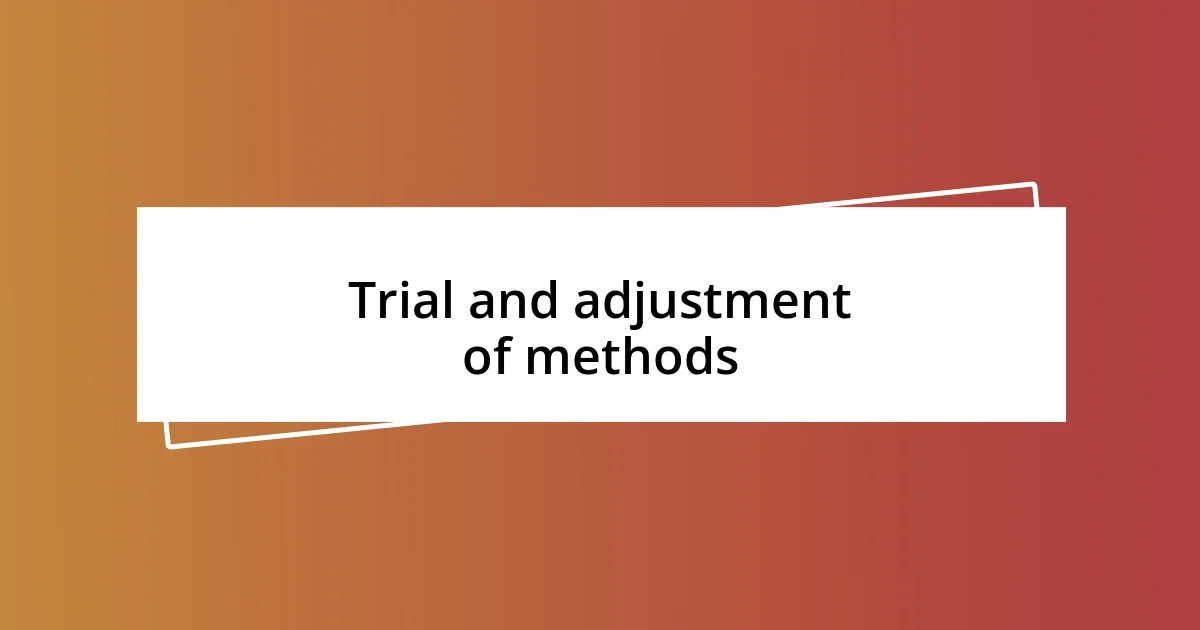
Trial and adjustment of methods
Finding the right contraceptive often felt like an ongoing experiment for me. After trying a couple of methods, I realized that what works wonders for one person might not work for another. I vividly remember switching from the pill to an IUD, only to discover that the adjustment period was a bit tougher than I anticipated. My body reacted differently, which led me to ask, “Is this normal?” Accepting that trial and adjustment were part of my journey was pivotal in my process.
There were days when I doubted whether I was on the right track. I often felt like I was playing a guessing game, where I would meticulously track my cycle and symptoms on my phone. One month, I experienced an increase in anxiety, leading me to wonder if my contraceptive was influencing it. I couldn’t help but think, “Shouldn’t this be more straightforward?” but with time, I learned that using a method requires tuning in to what my body says. Reflecting on these experiences helped me recognize that adjustment is not only valid but necessary.
Ultimately, I discovered that each method required its own period of trial and adaptation. I began to note how I felt mentally and physically with each change, which turned my journey into a meaningful exploration of my body. For example, when I switched to a low-dose hormonal method, I made it a point to give it a solid three months before jumping to conclusions. Have you ever found yourself on a similar path? Embracing the uncertainty while allowing for adjustments taught me a valuable lesson on patience and self-compassion in our health choices.
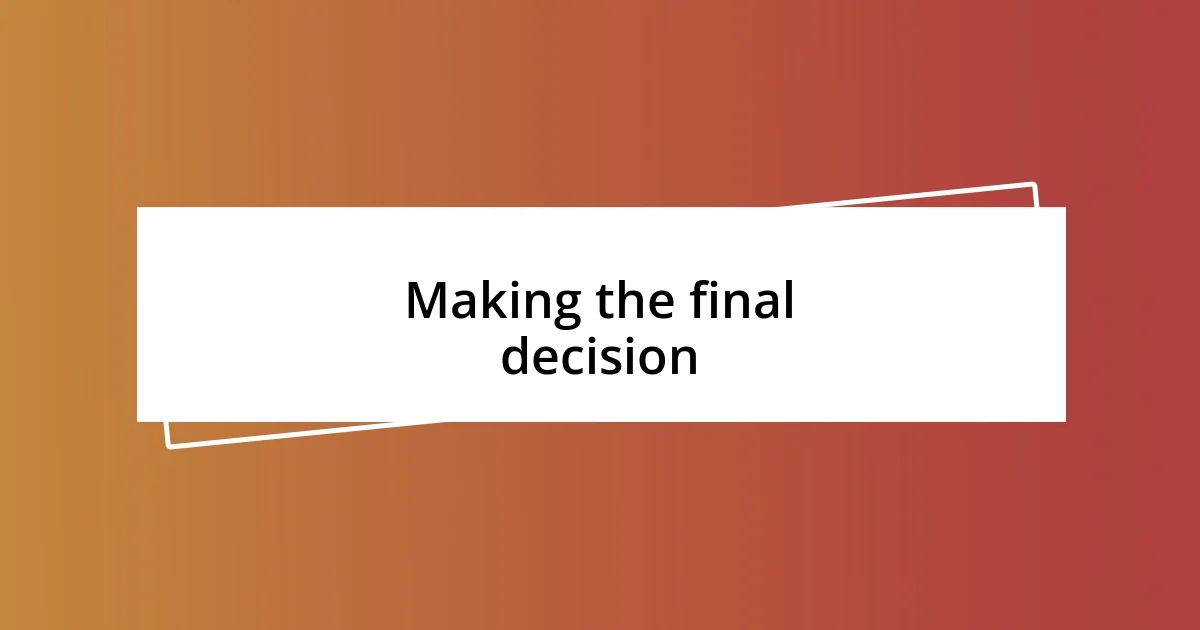
Making the final decision
Making the final decision was perhaps the most daunting part of my journey. After carefully weighing the pros and cons of each method, I felt a mix of excitement and anxiety. I remember the moment when I had to choose between another month of trial or committing to a long-term option. It made me realize, was I ready to invest in a method that could potentially reshape my everyday life?
I recall sitting at my kitchen table, scrolling through my notes and reflecting on everything I learned. Each method had its unique potential, but it was ultimately about how I felt deep down. I vividly remember when I finally grasped that the best choice wasn’t necessarily the most popular among friends but one that resonated with my body and lifestyle. This internal realization gave me clarity and confidence, as I pondered, don’t we deserve to feel content in our choices?
The day I made my decision was liberating. I recall the conversation with my doctor when I confidently expressed my choice. I felt a wave of relief wash over me, almost as if I had unlocked a door to a new chapter. Yet, beneath that relief was a layer of vulnerability—what if it didn’t work out? It made me appreciate the process more deeply, a reminder that every decision we make on our health journey is part of our personal story. Wouldn’t you agree that embracing our choices, even with the uncertainty they bring, can be incredibly empowering?











